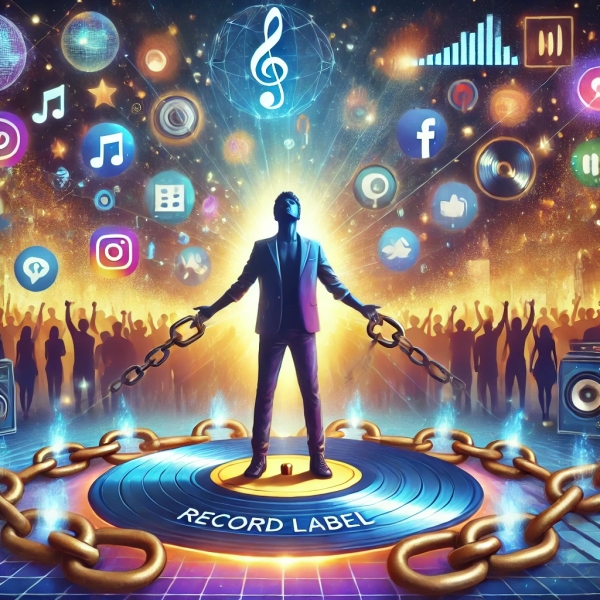The music industry has undergone a seismic shift over the past two decades. Gone are the days when signing with a major record label was the golden ticket to fame and fortune. Today, many artists are choosing to go independent, and for good reason. The tools, platforms, and opportunities available in this digital age make independence not only viable but often preferable. Here's why artists should consider this path and how to navigate it successfully.
Why Go Independent?
-
Creative Freedom
Major labels often dictate the creative direction of an artist’s music. From song choices to album artwork, an artist’s vision can be compromised in favor of what the label deems commercially viable. By going independent, you retain full control of your creative output. Your music, your vision. -
Financial Control
While record deals may come with hefty advances, they’re essentially loans that must be recouped. Labels take a significant percentage of royalties, leaving many artists with minimal earnings despite high sales or streams. As an independent artist, you keep a larger share of your profits and can structure your finances in a way that benefits you directly. -
Ownership
Ownership is power. When you’re signed to a label, they often own your master recordings. This means they control how your music is used, licensed, and distributed. Independent artists, on the other hand, have the ability to own their masters and retain long-term control over their art. -
Direct Fan Connection
The rise of social media, streaming platforms, and crowdfunding has made it easier than ever for artists to connect directly with their audience. By cutting out the middleman, independent artists can build genuine relationships with fans, leading to a more loyal and engaged community. -
Technological Advancements
The democratization of music production and distribution means that anyone with talent and determination can succeed. Affordable recording software, online distribution platforms, and marketing tools have leveled the playing field, making it possible for independent artists to compete with major label acts.
How to Go Independent the Right Way
While the independent route offers many advantages, it also comes with its challenges. Here are some tips to help you navigate the journey successfully:
1. Build Your Team
Just because you’re independent doesn’t mean you have to do it all alone. Surround yourself with professionals who can help elevate your career. This might include a manager, booking agent, publicist, and entertainment lawyer. Having the right team ensures you’re making informed decisions and staying organized.
2. Educate Yourself
Knowledge is power. Take the time to understand the music business, from royalties and publishing to marketing and distribution. Platforms like YouTube, podcasts, and music business books are excellent resources for learning the ins and outs of the industry.
3. Create a Strong Brand
Your brand is more than your music; it’s your story, your aesthetic, and your values. Develop a cohesive image that resonates with your audience. This includes your visuals, social media presence, and how you engage with fans.
4. Utilize Digital Platforms
Take advantage of platforms like DistroKid, TuneCore, or CD Baby to distribute your music to streaming services like Spotify, Apple Music, and Tidal. Additionally, use social media platforms like Instagram, TikTok, and YouTube to promote your music and connect with fans.
5. Invest in Quality
While it’s possible to record music on a budget, investing in quality production, mixing, and mastering can make a significant difference. The same goes for visuals like album covers and music videos. High-quality content not only attracts listeners but also shows that you take your craft seriously.
6. Build a Fanbase
Focus on creating meaningful connections with your audience. Engage with them on social media, respond to comments, and even involve them in your creative process. Consider building an email list to keep fans updated on new releases, shows, and merchandise.
7. Diversify Your Income Streams
Relying solely on streaming revenue can be risky. Explore other revenue streams like merchandise, live performances, licensing your music for film and TV, and crowdfunding through platforms like Patreon or Kickstarter.
8. Stay Consistent
Consistency is key in the music industry. Regularly release new music, post on social media, and interact with your audience. This keeps you on their radar and helps build momentum for your career.
Challenges to Consider
Going independent is not without its hurdles. It requires discipline, hard work, and patience. You’ll need to wear multiple hats—artist, marketer, accountant—and handle tasks that a label would typically manage. However, the rewards of independence—creative control, financial stability, and personal fulfillment—are well worth the effort.
Final Thoughts
In today’s music industry, going independent is more than just a possibility; it’s a powerful way to take control of your career. By leveraging technology, building a solid team, and staying dedicated to your craft, you can carve out a successful path on your own terms. Independence doesn’t mean isolation—it means freedom to be the artist you were meant to be. So take the leap, believe in your vision, and watch your career thrive.



